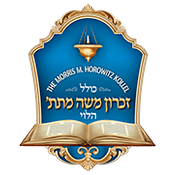Parshas Noach 1


׳׳אלא תולדות נח נח איש צדיק תמים הי׳ בדרתיו…׳׳ בראשית ו:ט
“These are the “offspring” of Noach – Noach was a righteous person, he was perfect in his generation…” Bereishis 6:9
The first pasuk in this week’s Parsha is peculiar. The pasuk begins to introduce the offspring of Noach and immediately sidetracks into a description of his fine character. Rashi in his first answer explains that the reason for this is, since the Torah mentioned the name of Noach it must tell of his praise, as we learn from the pasuk in Mishlei of ׳׳זכר צדיק לברכה׳׳ –“The remembrance of a righteous person shall be for blessing.” Interestingly enough, Rashi
himself in Mishlei explains that this pasuk comes to teach us that when one mentions the name of a צדיק , he will
come to bless the צדיק . The question then becomes, how is the continuation of our local pasuk a blessing for
Noach? How is describing that Noach was a righteous man and perfect in his generation considered a blessing?
The pasuk seems to be merely praising Noach for his spiritual accomplishments. Furthermore, Rashi at the end of
our pasuk on the word ׳׳בדרתיו׳׳ explains that some authorites understand that Noach was a tremendous צדיק and
had he lived in a generation of צדיקים he would have been only greater, whereas other authorities contend that
Noach was not that big of a deal, only in comparison to his own terribly wicked generation was he considered righteous, but had he lived in the times of Avraham Avinu he would not have amounted to anything. According to the second opinion that Noach was not on the level of a true צדיק , why would Rashi explain that the pasuk is
mentioning his praises because of ׳׳זכר צדיק ברכה׳׳ when Noach was really no great shakes at all?
We find that the Gemara in Yoma asks, where do we learn the concept of ׳׳זכר צדיק ברכה׳׳ from the Torah?
The Gemara answers, that we see when Hashem mentions Avraham Avinu in Parshas Vayeira, He immediately gives
Avraham the bracha of ׳׳ואברהם היו יה׳ לגוי גדול…׳׳ – “Avraham is surely to become a great and mighty nation”. Rashi
explains that since Hashem mentioned Avraham’s name, He blessed him. It seems clear that Avraham was indeed
literally blessed after he was mentioned. By the way, R’ Akiva Eiger on the side of the Gemara over there says נח׳׳
׳׳עיין רש׳׳י בחומש ריש פרשת . Again the question begs, why with regard to Noach was his ׳׳ברכה׳׳ so to say, not a literal blessing, rather a mention of his praise?
The Vilna Gaon in his commentary on Mishlei explains that the word ׳׳זכר׳׳ in the pasuk of ׳׳זכר צדיק לברכה׳׳
refers to the מצות עשה ומעשים טובים – the positive commandments and good deeds of the צדיק , which are for the צדיק a ברכה , meaning that the good deeds that the צדיק has performed in his lifetime are a blessing in and of themselves. Therefore the remembrance of a צדיק is eternally for ברכה as the legacy of the good deeds that he had performed lives on forever.
With this explanation perhaps we can answer for those authorities that are דורש לגנאי . Rashi says that לגנאי
דורש means that Noach would not have made mettle if he had lived in the generation of Avraham. Perhaps that is
why by Avraham, when Hashem mentioned his name, He gave Avraham an outright blessing for it was clear that
Avraham was a צדיק , whereas after Noach was mentioned it may still have been unclear if he was a true .צדיק
Therefore, the Torah relates his praise, proving that he was a ׳׳נח איש צדיק׳׳ – צדיק , which in and of itself will bring
down a ברכה for Noach on account of his מצות עשה and good deeds. This may be why Rashi in Parshas Noach
brings the pasuk in Mishlei specifically and not the pasuk by Avraham Avinu because by Avraham, Hashem gave
him a definitive blessing. By Noach where there is no standard blessing mentioned in the pasuk, Rashi learns from
׳׳זכר צדיק לברכה׳׳ which as the Gra explained means that the good deeds of the צדיק cause inherent ברכה for the צדיק , which is what the pasuk is doing by listing Noach’s מעשים טובים which are for him a ברכה.
׳׳זכר צדיק לברכה׳׳ and חס ושלום vice versa ׳׳שם רשעים ירקב׳׳ are facts of Life and the Afterlife. Our fulfillment of מצות עשה and performance of מעשים טובים will אי׳׳ה cause our remembrance to be eternally לברכה – for blessing.
Moshe Rothenberg / MMHK
